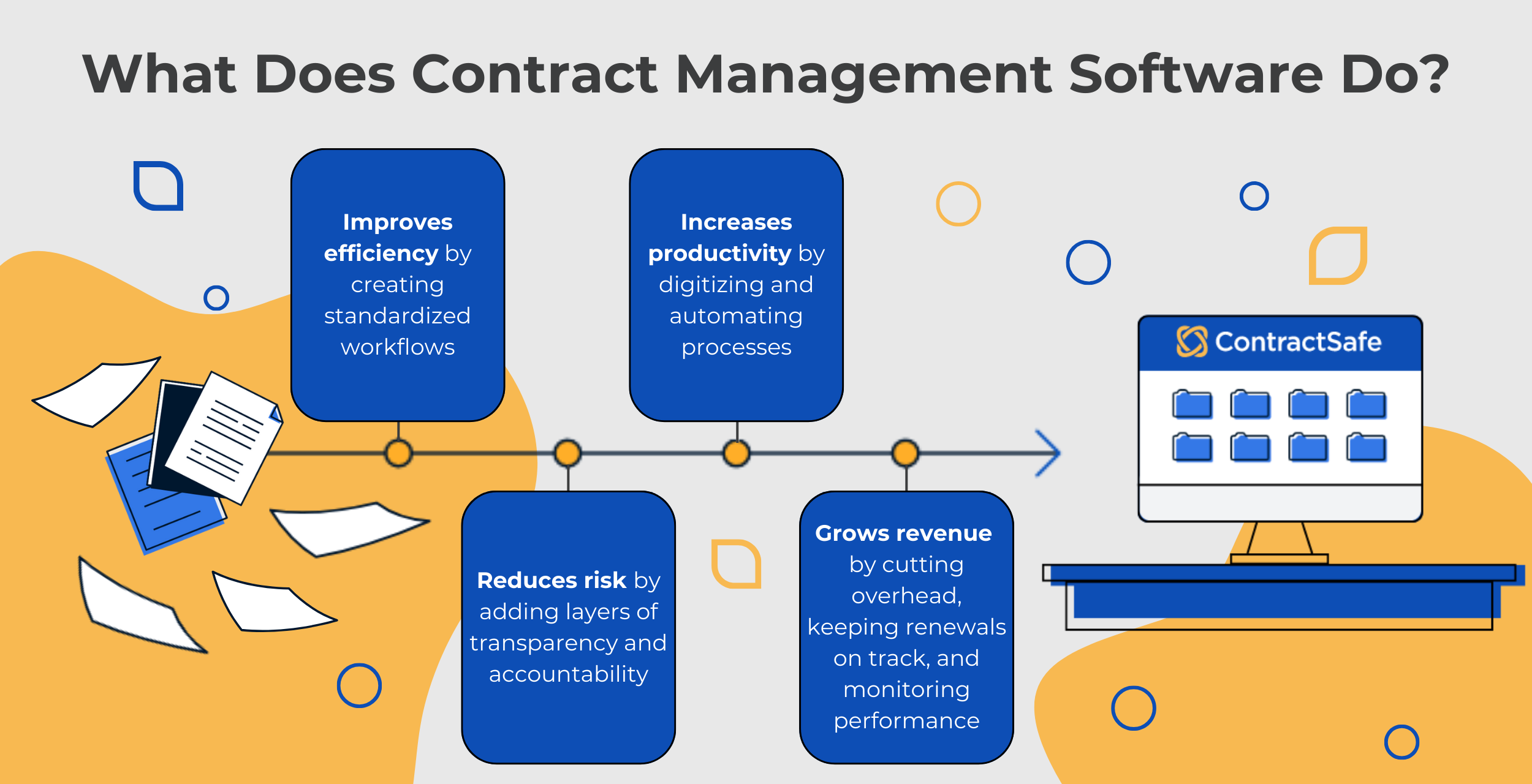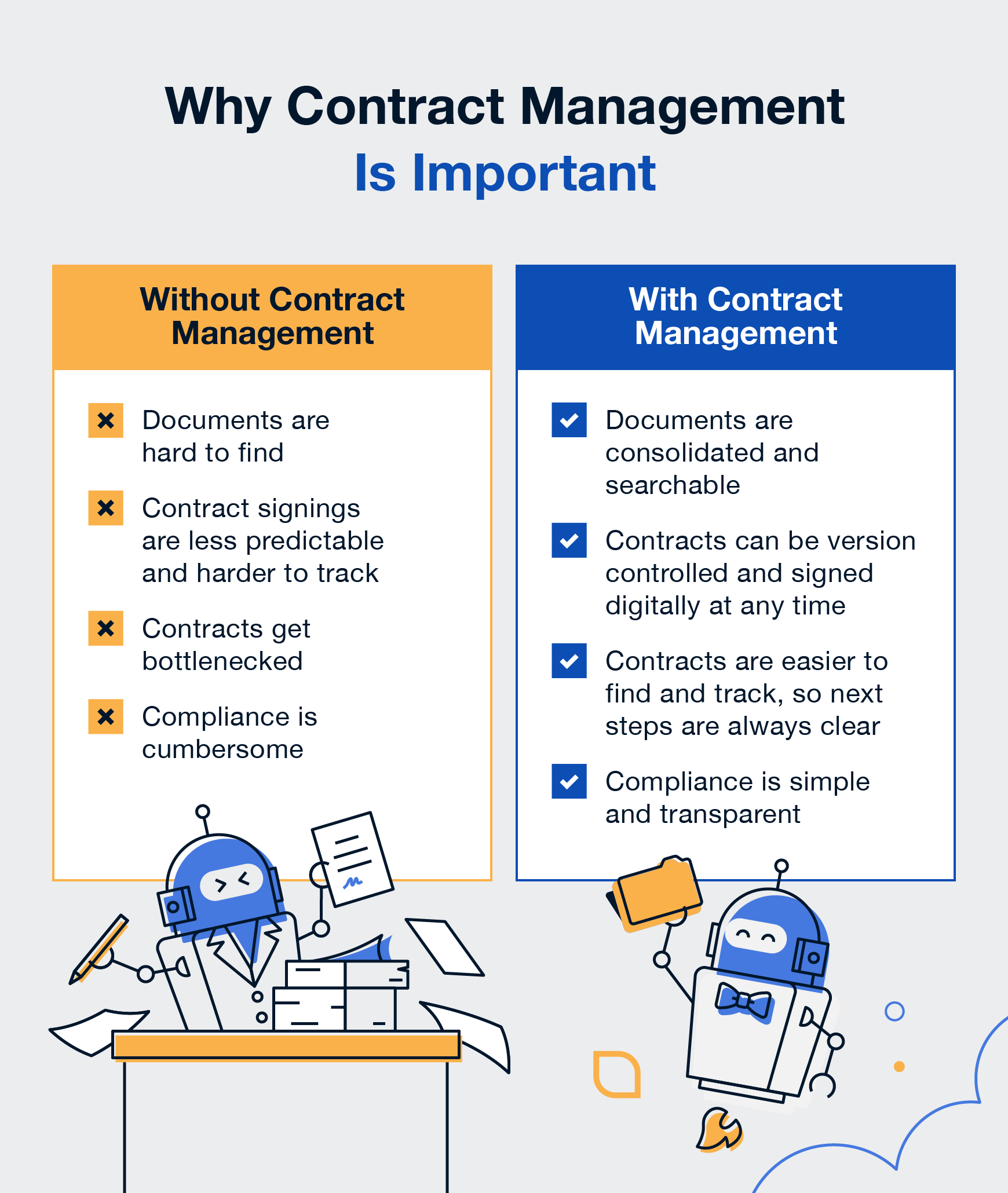As anyone who handles them knows, contracts are the backbone of every organization. From the software license agreement you clicked "accept" on this morning to the client agreement that landed your biggest new customer, contracts keep the business world spinning. Yet, here's the kicker, 89% of organizations don't feel their contracting process is "very effective."
If you've ever spent 20 minutes hunting through email threads for the latest version of a contract, or missed a renewal deadline that cost your company money, you're definitely not alone. The good news? You don't have to live with spreadsheet chaos and shared folder nightmares any longer.
Whether you're drowning in contracts, looking to upgrade from your current system, or just trying to figure out what all the CLM buzz is about, this guide has you covered. We'll walk you through everything from the basics to the latest AI-powered features that are changing the game.
What is Contract Management?
Contract management is the process of organizing, storing, tracking, and monitoring signed contracts and legal agreements to ensure compliance, maximize value, minimize risk, and maintain clear visibility into ongoing obligations and renewal opportunities.
Think of contract management as everything that happens to your contracts after they're signed—making sure you can find them when you need them, tracking important dates like renewals, monitoring compliance, and getting the most value out of your existing agreements. It's way more than just storing your PDFs in a shared folder somewhere (though sadly, that's what a lot of companies are still doing).
Good contract management means you actually know:
- Where all your contracts are and can find them when you need them
- What's in those contracts without having to read through pages of legal text
- When important dates are coming up like renewals or payment deadlines
- How well your contracts are performing and whether you're getting good value
- Who's supposed to do what and whether they're actually doing it
The person handling this (often called a contract manager) usually gets stuck with everything from writing up agreements, chasing down signatures, to tracking dates. It's a lot for one person to handle.
That's exactly why businesses are looking for software solutions that can bring some order and make contract management less of a headache.

Why is Contract Management Important?
Adding structure to the contract lifecycle is important because it keeps legal documentation efficient, scalable, compliant, and cost-effective. Operating an organization without sounds contract management processes can make contract workflows less consistent and efficient while increasing the risk of mistakes.
Contract management helps by:
- Making contracts easy to find: When contracts are centralized and organized, people can easily find the documents they need.
- Making contracts easy to sign: With version control and e-signature, contracts move through workflows more efficiently.
- Ensuring everyone's on the same page: When you have standard workflows and templates, you're not reinventing the wheel every time.
- Reducing costs and increasing revenue: In addition to storing them, you can track renewal opportunities, spot cost-saving chances, and negotiate better terms based on real data..
- Maintaining compliance: Process helps ensure all signing parties are keeping up with essential terms, conditions, and procedures.


Contract Management vs. Contract Lifecycle Management
Contract Lifecycle Management (CLM) is the complete process of managing contracts from initial creation and negotiation through execution, performance monitoring, and renewal or termination..
The main difference between contract management and contract lifecycle management (CLM) is areas of focus. Contract Management is more focused on post-signature phases, while contract lifecycle management broadly encompasses all contract phases.
Contract management is a more generalized ongoing process of activities like date tracking, reporting, and ensuring obligations are being met. This is either done manually (often with spreadsheets) or with contract management software.
Contract lifecycle management also includes those contract phases, but it has a more granular focus on what goes on before contracts are signed. CLM is concerned with each part of the contract lifecycle - including contract drafting, collaboration, and negotiation - and enables team to manage them with dedicated software.
| Feature | Contract Management | Contract Lifecycle Management (CLM) |
|---|---|---|
| Primary Focus | Post-signature contract organization, tracking, and compliance | Pre- and post-signature automation plus full lifecycle management |
| Core Functionality | AI-powered data extraction, contract storage, search, compliance tracking, renewal management, user roles and permissions, basic reporting | Contract drafting, clause library, approval workflows, e-signature, negotiation tools, comprehensive analytics |
| Automation Level | Data extraction, alerts and reminders | Comprehensive workflow automation and AI capabilities |
| Integration Capabilities | Limited integrations | Extensive integrations with CRM, ERP and business systems |
| AI Features | Search, meta data extraction and categorization | Advanced contract analysis, risk scoring, clause extraction |
| Implementation Time | Days to Weeks |
Multiple weeks to Months (often wit change management program) |
The bottom line? If your organization mainly needs help organizing, tracking existing contracts and data management, contract management software might be perfect. But if you want to streamline the entire process of getting contracts created, approved, and signed, while also managing them afterwards, a CLM solution is probably worth the investment.
What are the Stages of the Contract Management Lifecycle?
There are several stages in the contract lifecycle that move from contract creation and negotiation through approval, execution and monitoring. Understanding the contract lifecycle help you identify where your current process might be falling short and where a software solution can make the biggest impact.
Stage 1: Intake and Contract Creation
The contract lifecycle begins with a request, whether it's a new customer agreement, vendor contract or employment documents. This stage typically involves: request initiation through intake forms or automated workflows; Template selection, and Initial Drafting. This is where you detail specifications like the counterparty, service details, start and end dates, prices, timeline expectations, and exceptions.
Stage 2: Contract Negotiation and Collaboration
The next step in the process is collaborative negotiation, which involves a back-and-forth conversation between parties. The overall goal here is to come to mutually beneficial terms. Modern CLM platforms eliminate the confusion of email-based negotiations by providing centralized collaboration spaced with real-time editing and comment tracking.
Stage 3: Contract Review and Approval
At this point, both parties will review the contract terms internally. This stage often causes contract delays as late edits and a lack of clear processes on both sides come into effect. Thankfully, CLM software offer automated approval workflows which can reduce approval times and provide clear visibility into where contracts are in the process.
Stage 4: Contract Execution
Now it's time to put pen to paper and sign your contract. Back in the day, this meant an in-person meeting using literal pens and paper, but these days, it usually means clicking a link and signing electronically.
Stage 5: Ongoing Contract Management and Renewal
After execution the real work of contract management begins:
- Obligation tracking to ensure all parties meet their commitments
- Milestone monitoring for key delivery dates and performance metrics
- Compliance verification against regulatory requirements
- Amendment processing when contract changes are needed.
Stage 6: Contract Renewal and Reporting
As contracts approach their end dates, organizations must decide whether to renew, renegotiate, or terminate. Reporting may be the most crucial points of the contract lifecycle, but they are also the most invisible. It's essential to keep ahead of expiration deadlines, stay on top of renewals, and analyze performance.
How Can Contract Management Software Help?
The best contract management software tools are designed to streamline contract creation, negotiation, organization, reporting, and ongoing monitoring. This software brings contracts out of the Stone Age and into the cloud age with features that let organizations digitize, standardize, and even automate contract processes.
Contract management software benefits are practically infinite, but some notable ones include:
- Simplifying contract creation: With intake forms, template libraries, data uploading features, stored data categorization, and automation tools, contracts practically write themselves.
- Improve accessibility. these solutions store contracts in one cloud-based location, so finding what you need is as simple as searching a keyword.
- Streamlining approval. Digitized contracts, approval workflows and e-signature capabilities allow all parties to access and sign contracts from anywhere.
- Integrating with workflows. Quality contract management software like ContractSafe integrates with the apps you already use, fitting them right into existing workflows.
- Enhancing monitoring and reporting: With automated renewal deadline alerts, centralized reporting dashboards, and real-time document tracking, everyone stays on top of contract status and performance.

Contract Software Must-Have Features
As you can see, there's a lot involved in contract management. With so many moving parts, it's hard to pull it all off without contract management software. Although many contract managers can create impressive color-coded Excel spreadsheets, these aren't ideal because, let's be real These spreadsheets usually only make sense to the person who created them.
A solid contract management solution is user-friendly for everyone involved in the contract lifecycle. Here are some noteworthy features to look for when evaluating contract management software.
- Alerts and Reminders: With more contracts than you can count, how can you be expected to stay on top of every deadline? Date-tracking alerts and scheduled reminders that go directly to your email do the remembering for you.
- Cloud-based Repository: These virtual filing cabinets ensure that even when you're out of the physical office, you can access exactly what you need when you need it -- and so can the right people involved in the contract management process with custom roles and permissions.
- Security: Don't just look for security. Look for best-in-class security like ContractSafe offers, with features like encryption, malware and virus detection, and vulnerability testing.
- Artificial Intelligence:: Everybody needs a (virtual) hand sometimes, and AI features like ContractSafe's [AI]ssistant can make work easier for everyone with features like smart search, instant data extraction, execution status recognition.
- Contract Tracking: Contract tracking functionality lets you see exactly where your documents stand with the click of a button or tap of a screen, helping you keep all your ducks in a proverbial row while keeping the contract ball moving.
- Search. Using optical character recognition (OCR) technology to digitize contracts into machine-readable text is vital. This allows for Google-like searching across contracts or even within a single scanned contract so you can find all mentions in a matter of seconds.
- Sharing and roles: Sharing may be caring, but not everyone in an organization needs to share the same access level. Customizable roles allow you to scale document access privileges on an individual basis, adding security while giving everyone just the resources they need.
- Integrations: Everything works better when your favorite apps play nice. Look for options, like ContractSafe that integrates with Docusign and Salesforce and 6,000 other apps through Zapier.
- Customer Support: Support is key when adopting any new software. ContractSafe offers unlimited customer support to help your team with the initial platform integration, We'll also provide customized training sessions and be available for any questions.
If you're ready to say goodbye to color-coded spreadsheets and messy shared folders on Drive and Dropbox, then say hello to the best contract management solution out there and request a demo.